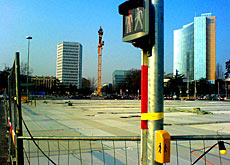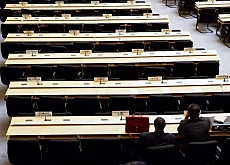Geneva NGOs brace for new UN rights body

Non-governmental organisations say they face a major challenge with the impending arrival of the new Human Rights Council in Geneva.
Around 50 human rights groups met in the city on Wednesday to discuss their strategy for the United Nations body, which sits for the first time in June.
“The establishment of this new UN body is an immense challenge for Switzerland, Geneva and for the NGOs,” said Daniel Bolomey, secretary-general of the Swiss branch of Amnesty International.
This is a view shared by the Swiss foreign ministry, which wants to develop the city as a centre of excellence for human rights, pooling the expertise of NGOs and academics.
“This success strengthens Geneva’s position as the capital of international humanitarian law and human rights, but there will also be a financial cost for Switzerland as the host country of this future council,” said spokesman Raphaël Saborit.
“Equally we need to galvanise the network of skills and expertise here in Geneva.”
First stone
A first stone was laid on Wednesday when NGOs met to discuss the latest developments and what the future holds. The idea for the meeting came during the International Film Festival on Human Rights, which finished on Saturday.
NGOs including the World Organisation against Torture, the International Federation of Human Rights, Amnesty International and Human Rights Watch, want guarantees that civil society will play an active role in the work of the future Human Rights Council.
The council, the result of a Swiss initiative, was created by the UN General Assembly in New York last week. It will replace the Human Rights Commission and is due to sit for the first time in Geneva on June 19.
Another issue that human rights defenders need to address is how to ensure a presence in Geneva throughout the year. The new council will hold at least three sessions lasting ten weeks, with the option of convening emergency meetings. The commission sat only once a year for a six-week session.
“The large organisations have the means to do this. But this is out of the question for the smaller NGOs, in particular those from developing countries,” said Bolomey. “NGOs like ours must ensure that they can fully participate in the process.”
Scramble for funding
But with Geneva already home to a large number of associations and groups involved in the protection of human rights, this could lead to more competition for funding.
“Up to the 1980s, there were no money problems. But since then competition has grown for funding that is increasingly harder to come by,” said Adrien-Claude Zoller, president of Geneva for Human Rights.
Zoller, whose organisation trains NGOs, says the growing influence of humanitarian agencies is a further handicap.
“Donors are more and more favouring these organisations at the expense of those working in the field of human rights.”
Eric Sottas, head of the World Organisation against Torture, points to another potential problem, which risks surfacing if the Human Rights Council lives up to expectations.
“Certain regimes hostile to human rights want to set up NGOs whose primary aim is to stifle the defence of victims and infiltrate NGO meetings.”
swissinfo, Frédéric Burnand in Geneva
155 countries have a permanent mission or representation in Geneva. Most of them have a specialist human rights officer.
Geneva is home to the UN High Commissioner for Human Rights, the Hugh Commissioner for Refugees, the International Committee of the Red Cross, the Federation of Red Cross and Red Crescent Societies, the International Organization for Migration and the International Labour Organization.
Several academic institutions in Geneva take a strong interest in human rights, including the Graduate Institute of International Studies.
The UN General Assembly voted to create the Human Rights Council on March 15.
The body, which stems from a Swiss initiative, will meet for the first time in Geneva on June 19.
It will replace the UN Human Rights Commission, which was set up in 1946.

In compliance with the JTI standards
More: SWI swissinfo.ch certified by the Journalism Trust Initiative



You can find an overview of ongoing debates with our journalists here. Please join us!
If you want to start a conversation about a topic raised in this article or want to report factual errors, email us at english@swissinfo.ch.